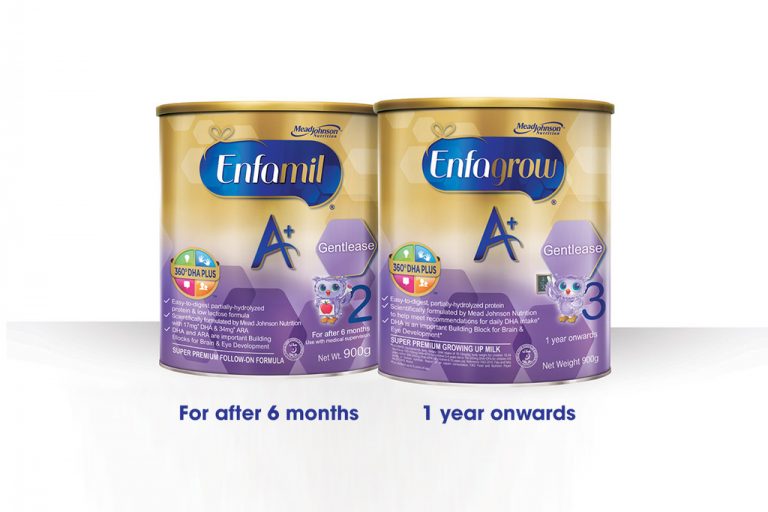SingaporeMotherhood | Baby & Toddler
July 2017
Don’t Let Your Baby’s Delicate Tummy Get in The Way of Important Milestones

Embrace the next stage in your little one’s journey – Dr Lian Wee Bin explains how you can help keep your baby on track.
If you have a baby over six months old with a delicate tummy, feeding may become a challenge. It is very normal to have concerns about his nutritional intake and development. To get an expert’s input and put your mind at rest, we posed some very common concerns and development related questions from parents to Dr Lian Wee Bin, Medical Director at SpecialKids Child Health & Development Clinic, Singapore.
Is my baby developing normally?
This is a common question asked by all parents as they navigate the wonders of their baby’s first year, and there’s no doubt everyone looks at the behaviour of other children of similar age as a benchmark. It’s perfectly normal to be eager to tick off developmental achievements, but babies, like adults, are all very different. Looking at other babies only gives you a general comparison. Dr Lian Wee Bin advises parents to match their own child against the standard guidelines in the Health Book1 provided and to make sure they are present and mindful of their child’s needs at each stage.
“Children develop very quickly, especially after six months. Parents can embrace this period by cultivating regular time, interaction and play with their child. Be on the ground with them. Challenge and provide consistent support for them as they explore and learn. It’s not about the quantity of time. The quality is also important, perhaps more important,” says Dr Lian Wee Bin.
It’s also good to keep an eye on everything with regular check-ups every three to four months and every six months once they become a toddler.

How important is nutrition for my baby’s development?
Nutrition is important for building the foundation for health and learning. Dr Lian explains, ‘’Nutrients provide the blocks for neuronal and thus cognitive development as well as affecting sensory development. To encourage the development of good gastrointestinal tract flora, parents need to ensure that their child is continually exposed to a combination of balanced solids and milk after six months.”
‘’If the nutrition is holistic, and by that I mean including all food groups, it should suffice. Development can be affected if the amount of nutrition or range of nutrients offered are insufficient,” says Dr Lian Wee Bin.
First time parents in particular may need to seek additional advice from their GP or paediatrician to ensure that everything is okay, particularly if their baby has a delicate tummy and is a fussy feeder.
What should my baby be doing after six months?

This depends on your unique little one. By nine months old, your child may or may not be doing the following, but by twelve months old they most likely will have acquired these developmental skills2:
Movement: Gross motor skills include starting to stand with support, crawling and sometimes cruising or even walking, while fine motor skills may include transferring objects from hand to hand or to another person as well as the start of the ‘’pincer grip’’.
Emotional: Social and cognitive skills are often demonstrated at the nine month old stage with the start of separation anxiety from mom and dad as the attachment to family deepens. This is also the time when babies become much more aware of “object permanence,’’ – the understanding that objects continue to exist even when hidden.
Language: Communication skills may be evident now and you may have also noticed baby doing lots of repetitive babbling with eye contact, responding through expression and understanding ‘no’ and waving goodbye.
I think I have a late developer. What should I do?
Dr Lian Wee Bin says, “The best advice I can give parents who think that their child may be a little late on the development scale is to increase their exposure to other children. I also encourage parents to play at eye level with their little one. Open up the opportunities for a variety of experiences including exploratory, purposeful play that is fun, imaginative and abstract. Remember to expose your child to different learning textural environments too such as sand, water, garden and beach play and of course put your mind at rest by seeking a developmental review with your GP or paediatrician, if you still need reassurance.”

Do milestones really matter?

Milestones do matter, especially major milestones such as walking or saying their first words, so it is important to keep track. However, it is also important to remember that it is better that your child achieves a milestone than not being able to achieve it. Small steps are important. Physical and mental development takes time. Babies older than six months just need to be experiencing or learning something new everyday3.
For parents wishing to investigate further, Dr Lian also recommends other sources of useful developmental information including the American Academy of Pediatrics4.
As a parent, you have every right to double check and get peace of mind. If you feel your child is not reaching his milestones, give him some time, and don’t hesitate to seek reassurance from your GP or regular paediatrician for a screening.
Find out about Enfamil A+ Gentlease Stage 2 and how will it support your fussy baby’s nutrient needs below.
With over 100 years of experience in paediatric nutrition, Mead Johnson Nutrition has scientifically formulated Enfamil A+ Gentlease Stage 2 with 360° DHA PLUS for children after 6 months of age, formulated with easy-to-digest partially hydrolyzed protein & low lactose, so it’s gentler on your baby’s delicate tummy. This formula provides balanced nutrition for supporting growth and development. Scientifically formulated with 17mg DHA & 34mg ARA per 100kcal, it helps meet recommendations◆ for infants 6-12 months.

Also available: Enfagrow A+ Gentlease Stage 3 for children aged one and above.
To learn more about supporting your child’s delicate tummy’s development, please click here.
◆ FAO/WHO recommends daily dietary DHA intake of 10-12mg/kg body weight for infants 6-12 months. Reference: FAO 2010. Fats and fatty acids in human nutrition. Report of an expert consultation. FAO Food and Nutrition Paper No.91.FAO: Rome.
Expert Resource:
Dr. Lian Wee Bin
Paediatrics and Neonatal Specialist
MBBS (Singapore) M Med (Paed), MRCP (UK), FAMS (Paed)
Certified paediatrician and neonatologist, registered with the Academy of Medicine, Singapore.
Dr Lian Wee Bin has acquired more than 25 years’ of medical experience as doctor, with the last 15 years focused on paediatrics, newborn medicine and developmental paediatrics.
1 http://digitalhealth.sg/hpb-health-booklet/
2 https://www.babycentre.co.uk/a713/your-nine-month-olds-development
3 http://www.webmd.com/parenting/baby/baby-development-9-month-old#2
4 https://www.aap.org/sites/Search/Pages/results.aspx?k=developmental+milestone
This is a sponsored post.
All content from this article, including images, cannot be reproduced without credits or written permission from SingaporeMotherhood.
Follow us on Facebook, Instagram, and Telegram for the latest article and promotion updates.





